25 Jul State of China’s Auto Market – July 2022
Easing of lockdown restrictions along with fresh stimulus results in a moderate sales recovery in June
EV sales surge to a record high and remain the only growth segment in a slowing China economy
Comments from Bill Russo, Founder & CEO of Automobility Ltd.
China’s auto market stabilized in June with easing of lockdowns which allowed production and supply to recover to a normal pattern. Overall 1st half new vehicle sales are down 6.6% versus last year.
The CV segment continued its steep decline which underscores economic weakness in China, which is compounded by the pull-ahead of sales into 2020 (when post-COVID stimulus measures resulted in record CV sales). PV sales in June were up 3.4%, with sales of new energy vehicles as the bright spot. Year-to-date, electric vehicle sales are up 120.4% compared with last year, a gain of 1.4 million units in the first half. This compares with a 19.4% decline in gasoline powered vehicle sales, a year-over-year loss of 2.3 million units in the first half.
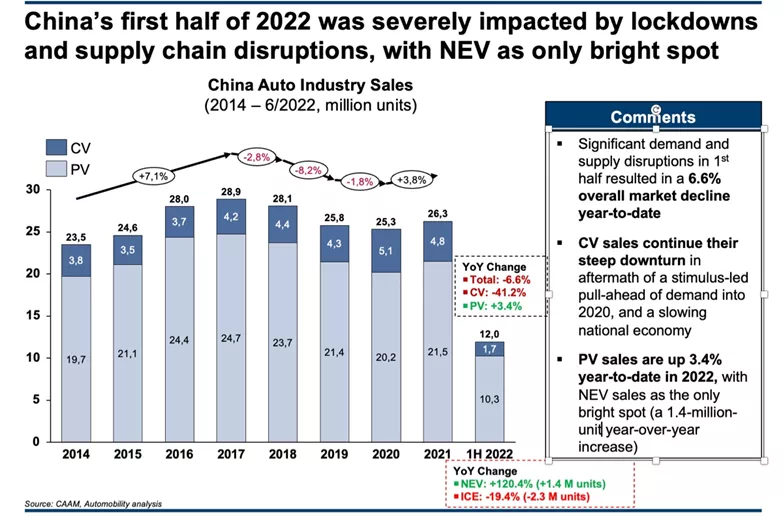
June sales were up 23.8% year-over-year, and were up 34.4% versus May. June sales performance is a solid indication of supply-side recovery, and is fueled by stimulus measures taken to recover April-May lockdown-related lost production. Vehicle purchase tax was halved to 5% for new gasoline-powered vehicles below 2.0L and priced below 300k RMB. While this helped spark near-term stability, we remain concerned over the sustainability of this recovery and there are continuing indications of demand-side weakness.
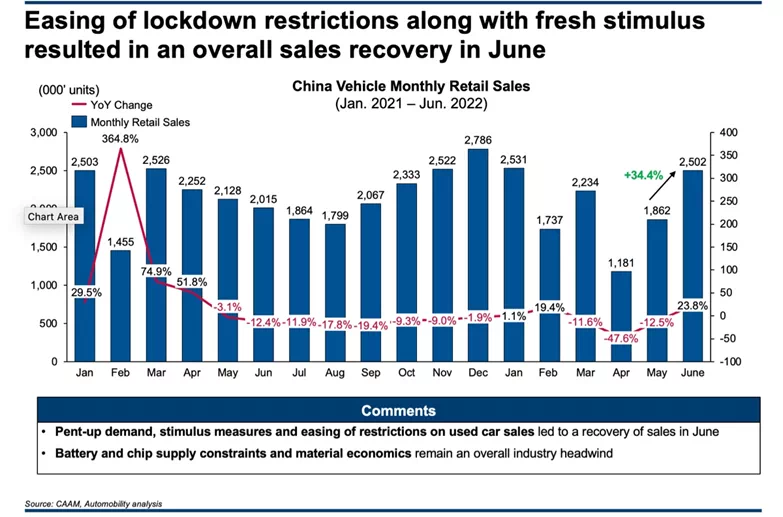
The sharp decline in CV sales is clear when looking at the monthly segment performance chart below, where CV sales have been consistently weak for 14 consecutive months. PV sales have recovered in the aftermath of the lockdown period, owing in part to the recent introduction of stimulus measures, which are mainly targeted at smaller and cheaper gasoline-powered vehicles. However, PV sales growth is mainly attributable to the rise in EV sales. NEVs comprised 23.8% of all vehicles sold in June.
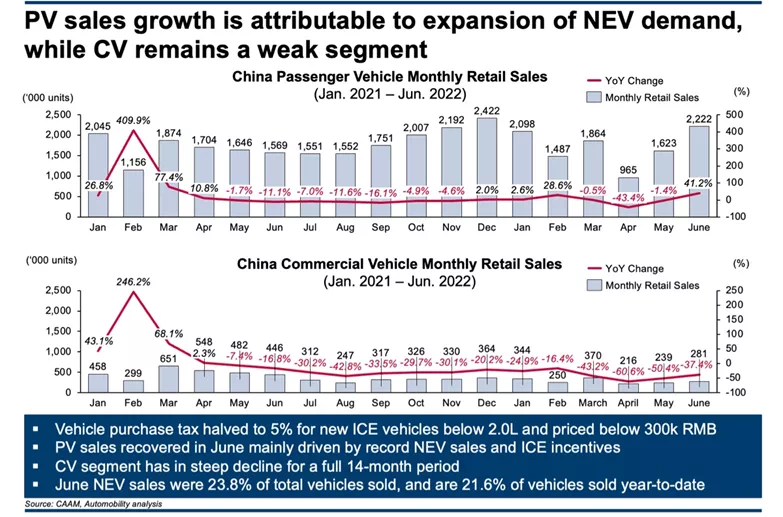
A further indication of demand-side weakness can be seen in used-car sales performance. In spite of measures recently taken to ease the transfer of cars between cities in China, which has long been a constraining factor on sales, used car transactions remain down 10.1% year-to-date, and were down 7.2% in June. This is an indication that consumers are holding on to their cars longer.
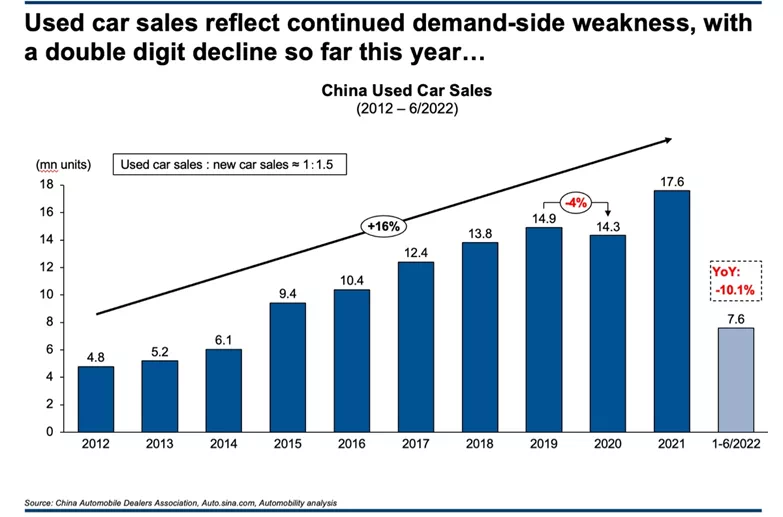
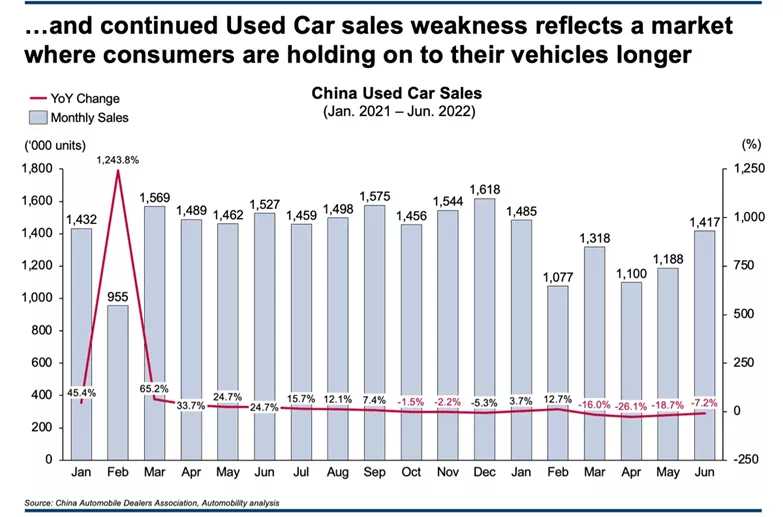
The increase in June new car sales, combined with continued weakness in used car sales results in a shift in demand mix in favor of low-priced new cars which is directly linked to the post-lockdown stimulus noted earlier. As recent stimulus measures favor smaller ICE vehicles (which tend to be sold to first-time buyers in lower-tier markets) this undercuts used car demand.
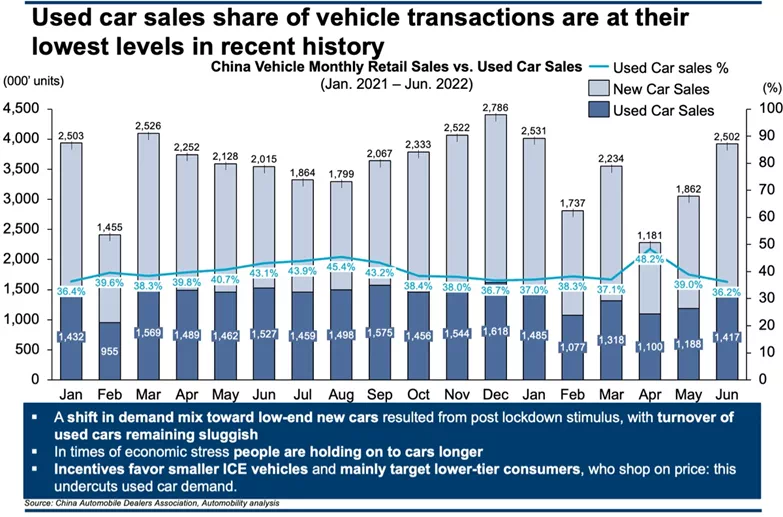
NEV sales set an all-time record of 596k units in June, rising 132.8% year-over-year. This is the main bright spot and growth story in the China market.
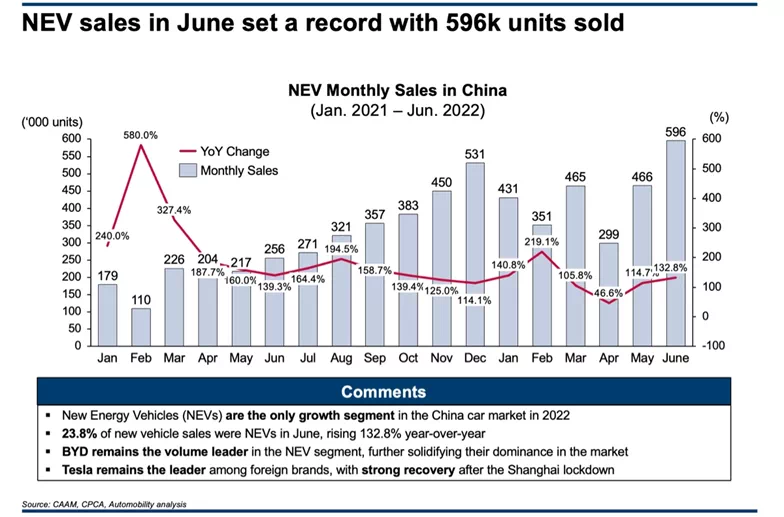
BYD continues its dominance as volume leader in the NEV market in June, which further underscores their supply chain strength and traction among EV consumers. BYD makes 5 of the top 10 selling EV nameplatessold in China.
Tesla regained its position and remains the only foreign brand on the leaderboard. Model Y was the top selling EV in China in June with 52,150 units sold. Tesla benefitted from pent-up demand from consumers unable to obtain their vehicles during the lockdown period, but may struggle to recover full year volumes in 2022.
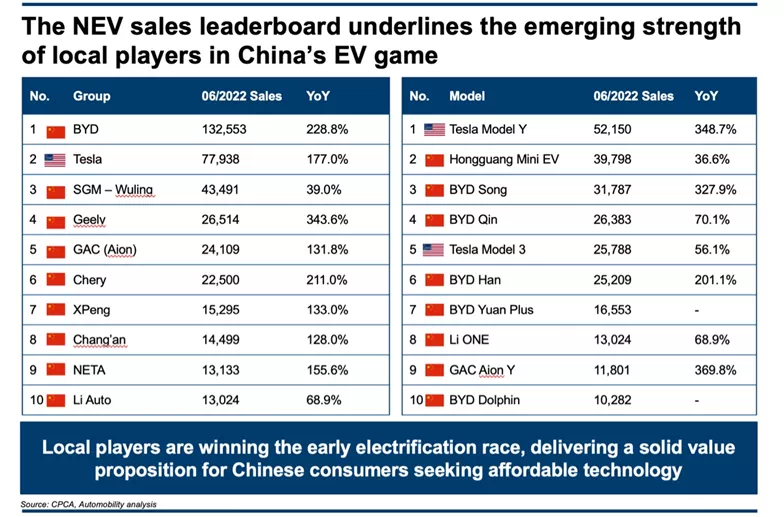
Overall, local brands grew sales their sales volume by 11% versus 2021. Foreign brands across the board experienced double digit declines in the first half of 2022. This is mainly attributable to Chinese dominance of the EV segment, along with recent stimulus measures which are mostly favorable to local carmakers.
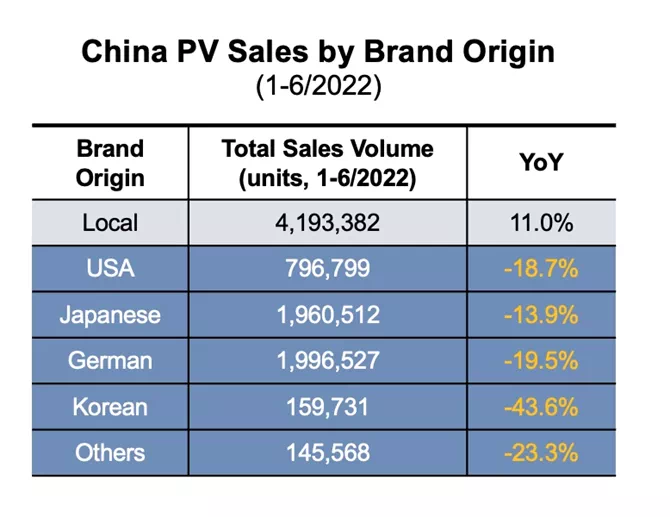
Chinese EV startups NIO, Li Auto, and Xpeng all experienced growth in June, but all were significantly outsold by Tesla. In fact, Model Y outsold all of the 3 companies combined (52,150 units), and Model 3 outsold each company individually (25,788 units).
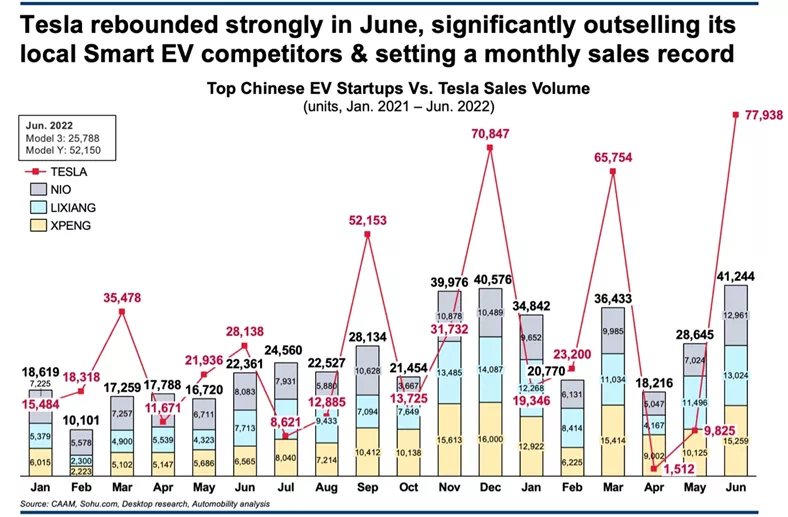
The Shanghai lockdown revealed Tesla’s dependency on its China gigafactory. For the first time in two years, Tesla’s global vehicle deliveries decreased quarter-on-quarter. Main reason for the slide was the shutdown of the Shanghai Gigafactory, causing a production deficit of 85,000 vehicles. Analysts estimated that Tesla should have delivered 340,000 vehicles if it weren’t for the lockdown in Q2, up 10% from last quarter. In addition, new factories in Berlin and Texas have struggled to ramp up production due to supply shortages. As a result, Tesla’s China production will remain crucial for the company’s global deliveries in 2022.
Several questions to consider:
– How sustainable is the June recovery?
– How will stimulus measures impact market demand in the long term?
– Besides Tesla, what can foreign brands do to get in the EV game in China?
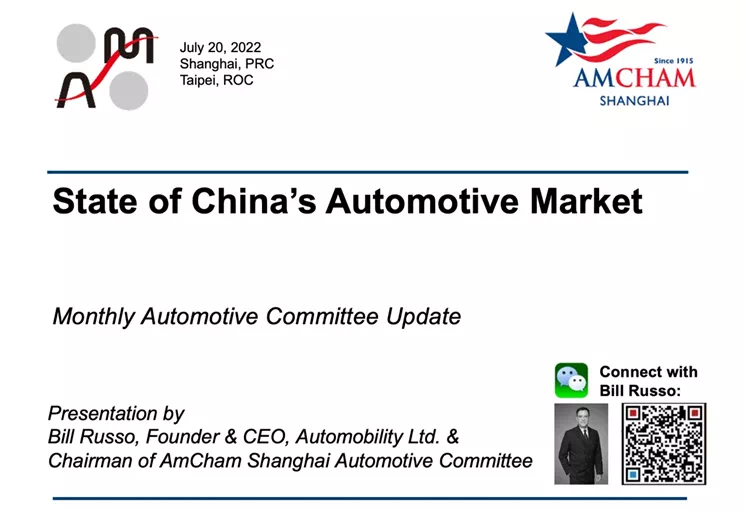
If you wish to join our next monthly AmCham Automotive Committee webinar on the State of China’s Auto Industry, you can register here:
Webinar | State of China Auto Market Monthly Briefing (July)
July 20, 2022 Wednesday
9:00 AM – 9:40 AM (GMT+8)
About Bill Russo
Bill Russo is the Founder and CEO of Automobility Limited, and is currently serving as the Chairman of the Automotive Committee at the American Chamber of Commerce in Shanghai. His 40 years of experience includes 15 years as an automotive executive with Chrysler, including 18 years of experience in China and Asia. He has also worked nearly 12 years in the electronics and information technology industries with IBM and Harman. He has worked as an advisor and consultant for numerous multinational and local Chinese firms in the formulation and implementation of their global market and product strategies.
About Automobility
Automobility Limited is global Strategy & Investment Advisory firm based in Shanghai that is focused on helping its clients to Build and Profit from the Future of Mobility. We help our clients address and solve their toughest business and management issues that arise in midst of fast changing, complicated and ambiguous operating environment. We commit to helping our clients to not only “design” the solutions but also raise or deploy capital and we can assist in implementation, often together with our clients. We put our clients’ interest first and foremost. We are objective and don’t view our client engagements as “projects”; rather as long-term relationships.
Our partners are former senior executives at large corporations and/or senior consultants at leading management consulting firms. We believe clients would benefit the most from a combination of consultants with substantive experience in consulting and in line management.
Therefore, we organize ourselves into a core team augmented by an extensive “extended team members” with a large variety of skills and expertise.
Contact us by email at info@automobility.io



Sorry, the comment form is closed at this time.